
Purpose
Tela is a Krita plugin Canvas Tool Box.
Link
Features
- Compact Tool Box
- Action Options
- View Options
- MirrorFix
- Color Picker ( connects to Pigment.O )
Preview


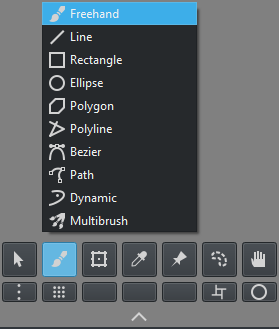








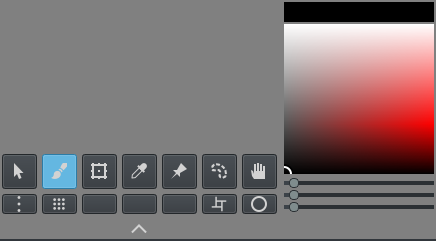
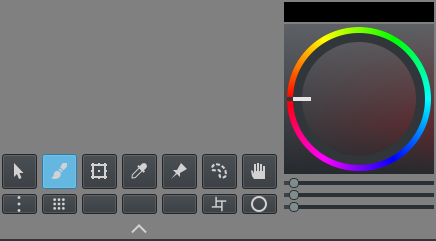
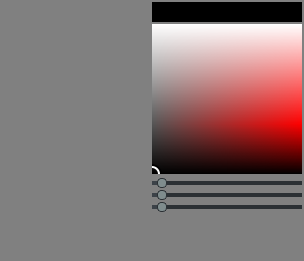
Wiki
Read the wiki for more information

Tela is a Krita plugin Canvas Tool Box.














Read the wiki for more information
Tela translated means canvas as in a painting canvas or computer monitor. I thought it to be appropriate since I was trying to make sort of little UI for certain features I find a bit far between clicks but still needs work though, since it is a bit odd of collection of features it needs some usage to mature and opinions are also welcomed. However the features I wanted to create to begin with are done for my current needs for how simple they might be.
So what does it do?
well I cant say I am inventing the wheel or anything for the most part it is just a tiny UI for already made stuff that are honestly better but needed to calculate what I really wanted that was the Guides in the Document section but then I sprinkled some more stuff around too because I was walking by and made something in the end I was not quite expecting.
Guides Edit Preview:
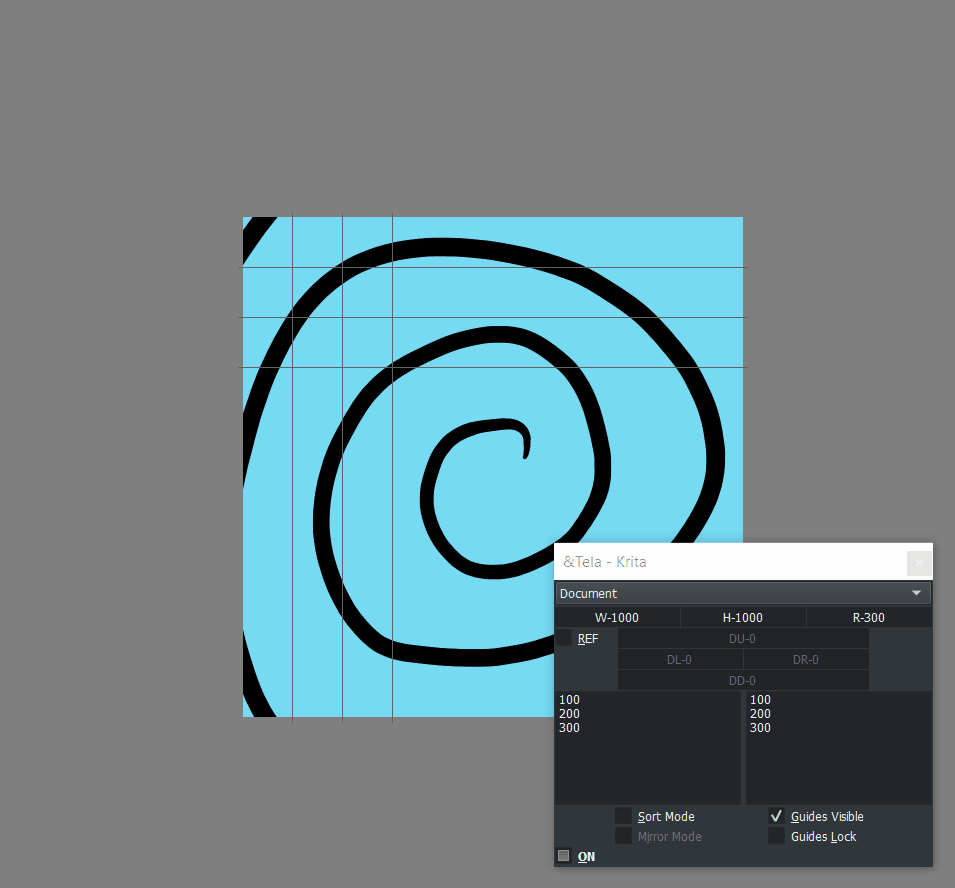
Update:
Link:
I did a bit of shuffling around for the interface and I think I arrived in a organization that pleases me more. Now it will only have 1 panel to display things, still a bit WIP there as to how to incorporate all the options I want it to have. I decided to use check-boxes on the bottom right here too to open and close the options underneath the panel.
In terms of bugs while using “Reference Size” occasionally Tela would drop a value on a guide due to decimals when editing too fast as I had too much faith in the system to work. I kinda made a approach that handles everything and then gives Krita the correct values after they are sorted not relying on Krita to work them properly on their positioning, and even if it goes so fast that it manages to mess up, the next cycle it will correct itself to the correct values ensuring the guides are properly managed.
Also guides now have a visual indicator that they are present even if they are not visible in the canvas.
Despite the Panel still not being very interactive you an rotate the canvas by clicking on the circle around the document square. Pressing Ctrl will snap the rotation to 10º increments.
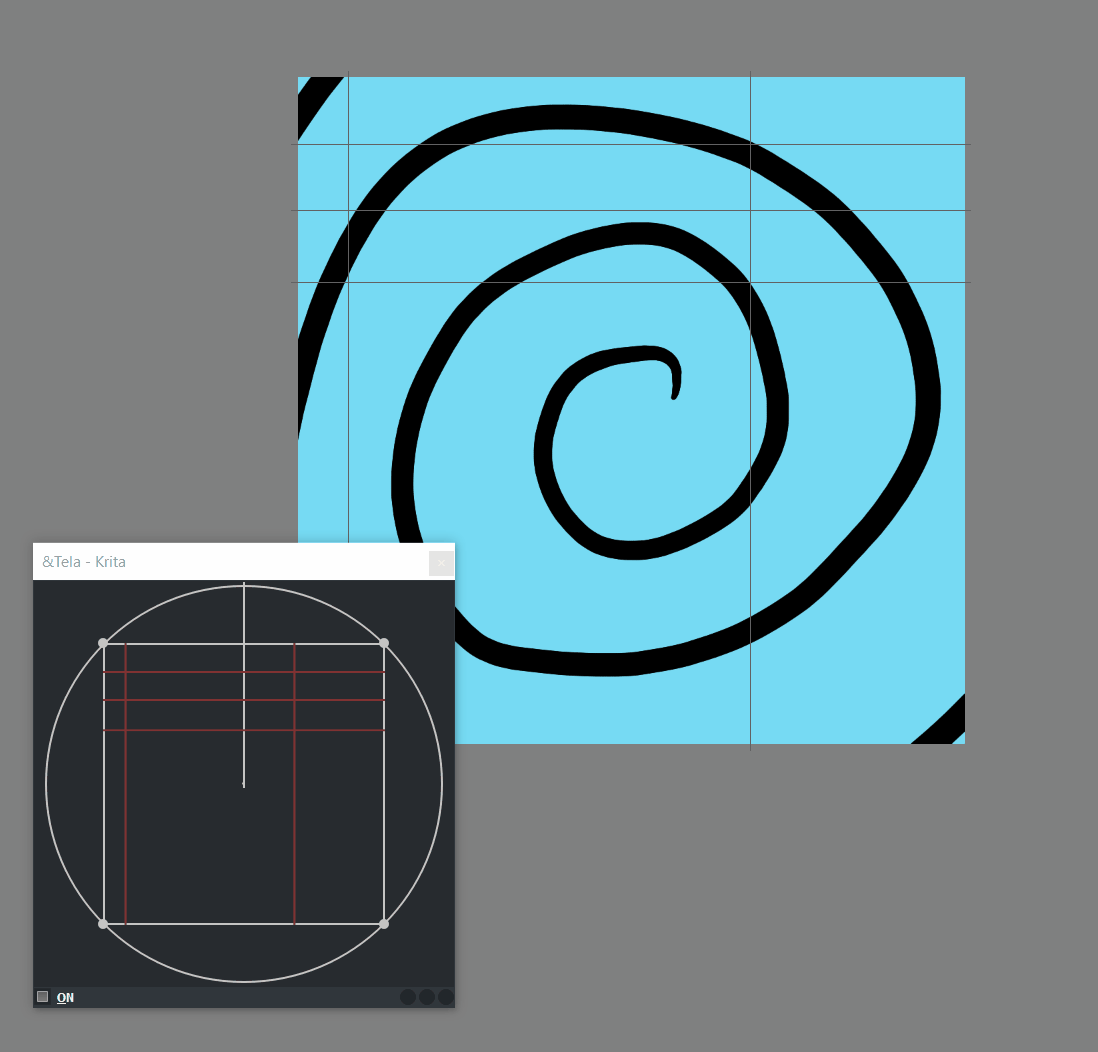
I want to add pan and zoom and canvas display to it but I haven’t found the API references to it yet. But I believe Tela has much space to grow as a plugin still.
Hello @EyeOdin!
For me, at first glance, it looks like the update is working. The only thing I noticed on quick review was the perceived slightly slower rotation of large images (very many layers, effects, ~10 GB according to Krita), compared to the plugin being turned off.
Since you deleted your post so quickly, I’d like to know, is there a reason not to use it?
So far tested on Windows 10 with the current 4.4.5 and the 5.0 prealpha b4a6f80.
Michelist
Not a big issue it was snapping to the wrong point when the Reference size was active so the image was stuck to the side. I fixed it already. but let me slow it down then too.
Thanks for the quick reply!
Take your time, I do not need it necessarily - I just always “have to” try everything immediately.  I’m like a big child. It’s like a compulsion.
I’m like a big child. It’s like a compulsion. 
Michelist
I did a small update where it displays the image your working with and it updates pretty fast by the looks of it. I am a bit unsure it will cause any lag on other systems but for me it is working.
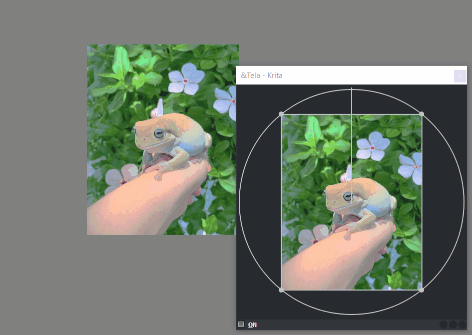
Now I am readding this better. Tela is eating 10gb of your ram when on?
No, I loaded an extra-large file (deliberately prepared, bloated with transform, fill and FX layers) to test Krita’s response in conjunction with Tela. For large complex images with many effects and layers etc., rotating the image with Tela seems a bit slower to me than without Tela (Tela deactivated). With my “normal” files of A3 600 PPI, with a few effects, transformations or so it is not noticeable.
These 10 GB are what Krita shows me in the title bar, nothing special, but for testing I like to challenge my PC, it is quite powerful and so I just give it “food” 
Michelist
Oh a workbench file~ okay okay.
I can’t say I maximized performance yet I still don’t know where the bottle necks reside for this but I have 1 or 2 guesses. I will work to make it go faster but my focus now is to make all the features I want it too have now I just don’t know how I want it to react to the commands.
@Michelist
I did a small tweak to it so it is a bit lighter with the display.
to me I see no difference but maybe with the workbench it does make a difference?
Hello @EyeOdin!
The version from today started with a “Script error”, but then ran, that is, was usable. However, it was now completely stuttering when trying to rotate the file. But it was the prepared file! “Normal files” can be rotated with it without stuttering or noticeable delay. Only the script error remains.
The part of the error message I could not copy here as a screenshot, the rest as text:
TypeError
Python 3.8.1: c:\TC_PP\Tools\krita-x64-4.4.3\bin\krita.exe
Tue Jul 6 12:46:00 2021
A problem occurred in a Python script. Here is the sequence of
function calls leading up to the error, in the order they occurred.
C:\Users\Surfbrett\AppData\Roaming\krita\pykrita\tela\tela_modulo.py in paintEvent(self=<tela.tela_modulo.Panel object>, event=<PyQt5.QtGui.QPaintEvent object>)
569 # Paint
570 def paintEvent(self, event):
571 self.drawColors(event)
572 def drawColors(self, event):
573 # Start Qpainter
self = <tela.tela_modulo.Panel object>
self.drawColors = <bound method Panel.drawColors of <tela.tela_modulo.Panel object>>
event = <PyQt5.QtGui.QPaintEvent object>
C:\Users\Surfbrett\AppData\Roaming\krita\pykrita\tela\tela_modulo.py in drawColors(self=<tela.tela_modulo.Panel object>, event=<PyQt5.QtGui.QPaintEvent object>)
602 # painter.scale(six,six)
603 # Draw QImage
604 painter.drawImage(
605 0,0,
606 self.doc_thumb)
painter = <PyQt5.QtGui.QPainter object>
painter.drawImage = <built-in method drawImage of QPainter object>
self = <tela.tela_modulo.Panel object>
self.doc_thumb = None
TypeError: arguments did not match any overloaded call:
drawImage(self, QRectF, QImage): argument 1 has unexpected type 'int'
drawImage(self, QRect, QImage): argument 1 has unexpected type 'int'
drawImage(self, Union[QPointF, QPoint], QImage): argument 1 has unexpected type 'int'
drawImage(self, QPoint, QImage): argument 1 has unexpected type 'int'
drawImage(self, int, int, QImage, sx: int = 0, sy: int = 0, sw: int = -1, sh: int = -1, flags: Union[Qt.ImageConversionFlags, Qt.ImageConversionFlag] = Qt.ImageConversionFlag.AutoColor): argument 3 has unexpected type 'NoneType'
drawImage(self, QRectF, QImage, QRectF, flags: Union[Qt.ImageConversionFlags, Qt.ImageConversionFlag] = Qt.ImageConversionFlag.AutoColor): argument 1 has unexpected type 'int'
drawImage(self, QRect, QImage, QRect, flags: Union[Qt.ImageConversionFlags, Qt.ImageConversionFlag] = Qt.ImageConversionFlag.AutoColor): argument 1 has unexpected type 'int'
drawImage(self, Union[QPointF, QPoint], QImage, QRectF, flags: Union[Qt.ImageConversionFlags, Qt.ImageConversionFlag] = Qt.ImageConversionFlag.AutoColor): argument 1 has unexpected type 'int'
drawImage(self, QPoint, QImage, QRect, flags: Union[Qt.ImageConversionFlags, Qt.ImageConversionFlag] = Qt.ImageConversionFlag.AutoColor): argument 1 has unexpected type 'int'
__cause__ = None
__class__ = <class 'TypeError'>
__context__ = None
__delattr__ = <method-wrapper '__delattr__' of TypeError object>
__dict__ = {}
__dir__ = <built-in method __dir__ of TypeError object>
__doc__ = 'Inappropriate argument type.'
__eq__ = <method-wrapper '__eq__' of TypeError object>
__format__ = <built-in method __format__ of TypeError object>
__ge__ = <method-wrapper '__ge__' of TypeError object>
__getattribute__ = <method-wrapper '__getattribute__' of TypeError object>
__gt__ = <method-wrapper '__gt__' of TypeError object>
__hash__ = <method-wrapper '__hash__' of TypeError object>
__init__ = <method-wrapper '__init__' of TypeError object>
__init_subclass__ = <built-in method __init_subclass__ of type object>
__le__ = <method-wrapper '__le__' of TypeError object>
__lt__ = <method-wrapper '__lt__' of TypeError object>
__ne__ = <method-wrapper '__ne__' of TypeError object>
__new__ = <built-in method __new__ of type object>
__reduce__ = <built-in method __reduce__ of TypeError object>
__reduce_ex__ = <built-in method __reduce_ex__ of TypeError object>
__repr__ = <method-wrapper '__repr__' of TypeError object>
__setattr__ = <method-wrapper '__setattr__' of TypeError object>
__setstate__ = <built-in method __setstate__ of TypeError object>
__sizeof__ = <built-in method __sizeof__ of TypeError object>
__str__ = <method-wrapper '__str__' of TypeError object>
__subclasshook__ = <built-in method __subclasshook__ of type object>
__suppress_context__ = False
__traceback__ = <traceback object>
args = ("arguments did not match any overloaded call:\n d....AutoColor): argument 1 has unexpected type 'int'",)
with_traceback = <built-in method with_traceback of TypeError object>
The above is a description of an error in a Python program. Here is
the original traceback:
Traceback (most recent call last):
File "C:\Users\Surfbrett\AppData\Roaming\krita\pykrita\tela\tela_modulo.py", line 571, in paintEvent
self.drawColors(event)
File "C:\Users\Surfbrett\AppData\Roaming\krita\pykrita\tela\tela_modulo.py", line 604, in drawColors
painter.drawImage(
TypeError: arguments did not match any overloaded call:
drawImage(self, QRectF, QImage): argument 1 has unexpected type 'int'
drawImage(self, QRect, QImage): argument 1 has unexpected type 'int'
drawImage(self, Union[QPointF, QPoint], QImage): argument 1 has unexpected type 'int'
drawImage(self, QPoint, QImage): argument 1 has unexpected type 'int'
drawImage(self, int, int, QImage, sx: int = 0, sy: int = 0, sw: int = -1, sh: int = -1, flags: Union[Qt.ImageConversionFlags, Qt.ImageConversionFlag] = Qt.ImageConversionFlag.AutoColor): argument 3 has unexpected type 'NoneType'
drawImage(self, QRectF, QImage, QRectF, flags: Union[Qt.ImageConversionFlags, Qt.ImageConversionFlag] = Qt.ImageConversionFlag.AutoColor): argument 1 has unexpected type 'int'
drawImage(self, QRect, QImage, QRect, flags: Union[Qt.ImageConversionFlags, Qt.ImageConversionFlag] = Qt.ImageConversionFlag.AutoColor): argument 1 has unexpected type 'int'
drawImage(self, Union[QPointF, QPoint], QImage, QRectF, flags: Union[Qt.ImageConversionFlags, Qt.ImageConversionFlag] = Qt.ImageConversionFlag.AutoColor): argument 1 has unexpected type 'int'
drawImage(self, QPoint, QImage, QRect, flags: Union[Qt.ImageConversionFlags, Qt.ImageConversionFlag] = Qt.ImageConversionFlag.AutoColor): argument 1 has unexpected type 'int'
Michelist
Update: Image display UI performance improvement
Took me a bit to feel the weight of the lag on bigger documents but I shoot for the roof and 5k-10k images and I could see what you meant even without effects over it.
I placed threading for the image query and now even on 10k images the brush seems to be working alright with no noticable lag or with the feeling of the brush being disabled by the UI lag.
Because of this you will notice a second of adjustment time when changing the documents size.
I did small tweeks
The following code appeared when I used today’s plugin. And krita cannot be opened
TypeError
Python 3.8.1: C:\GAMES\STEAM\steamapps\common\Krita\krita\bin\krita.exe
Tue Jul 13 19:37:53 2021A problem occurred in a Python script. Here is the sequence of
function calls leading up to the error, in the order they occurred.C:\Users\123\AppData\Roaming\krita\pykrita\tela\tela.py in Krita_TIMER(self=<tela.tela.TelaDocker object>)
480 font.setBold(True)
481 self.layout.check.setText(“ON”)
482 self.Krita_2_Tela()
483 self.timer.start()
484 self.q_image = True
self = <tela.tela.TelaDocker object>
self.Krita_2_Tela = <bound method TelaDocker.Krita_2_Tela of <tela.tela.TelaDocker object>>C:\Users\123\AppData\Roaming\krita\pykrita\tela\tela.py in Krita_2_Tela(self=<tela.tela.TelaDocker object>)
634 self.SOF_1_READ(40)
635 if self.sof_2 != 100:
636 self.SOF_2_READ(100)
637 if self.sof_3 != 100:
638 self.SOF_3_READ(100)
self = <tela.tela.TelaDocker object>
self.SOF_2_READ = <bound method TelaDocker.SOF_2_READ of <tela.tela.TelaDocker object>>C:\Users\123\AppData\Roaming\krita\pykrita\tela\tela.py in SOF_2_READ(self=<tela.tela.TelaDocker object>, value=100)
1784 self.layout.sof_2_slider.update()
1785 self.layout.sof_2_value.update()
1786 self.Panel_Update()
1787 def SOF_2_Minus(self):
1788 if ((self.canvas() is not None) and (self.canvas().view() is not None)):
self = <tela.tela.TelaDocker object>
self.Panel_Update = <bound method TelaDocker.Panel_Update of <tela.tela.TelaDocker object>>C:\Users\123\AppData\Roaming\krita\pykrita\tela\tela.py in Panel_Update(self=<tela.tela.TelaDocker object>)
665 self.layout.panel.update()
666 else:
667 self.panel.Update_Panel(
668 False, False,
669 False,
self = <tela.tela.TelaDocker object>
self.panel = <tela.tela_modulo.Panel object>
self.panel.Update_Panel = <bound method Panel.Update_Panel of <tela.tela_modulo.Panel object>>
self.layout = <PyQt5.QtWidgets.QWidget object>
self.layout.panel = <PyQt5.QtWidgets.QWidget object>
self.layout.panel.width =
self.layout.panel.height =
TypeError: Update_Panel() takes 21 positional arguments but 23 were given
cause = None
class = <class ‘TypeError’>
context = None
delattr = <method-wrapper ‘delattr’ of TypeError object>
dict = {}
dir =
doc = ‘Inappropriate argument type.’
eq = <method-wrapper ‘eq’ of TypeError object>
format =
ge = <method-wrapper ‘ge’ of TypeError object>
getattribute = <method-wrapper ‘getattribute’ of TypeError object>
gt = <method-wrapper ‘gt’ of TypeError object>
hash = <method-wrapper ‘hash’ of TypeError object>
init = <method-wrapper ‘init’ of TypeError object>
init_subclass =
le = <method-wrapper ‘le’ of TypeError object>
lt = <method-wrapper ‘lt’ of TypeError object>
ne = <method-wrapper ‘ne’ of TypeError object>
new =
reduce =
reduce_ex =
repr = <method-wrapper ‘repr’ of TypeError object>
setattr = <method-wrapper ‘setattr’ of TypeError object>
setstate =
sizeof =
str = <method-wrapper ‘str’ of TypeError object>
subclasshook =
suppress_context = False
traceback =
args = (‘Update_Panel() takes 21 positional arguments but 23 were given’,)
with_traceback =The above is a description of an error in a Python program. Here is
the original traceback:Traceback (most recent call last):
File “C:\Users\123\AppData\Roaming\krita\pykrita\tela\tela.py”, line 482, in Krita_TIMER
self.Krita_2_Tela()
File “C:\Users\123\AppData\Roaming\krita\pykrita\tela\tela.py”, line 636, in Krita_2_Tela
self.SOF_2_READ(100)
File “C:\Users\123\AppData\Roaming\krita\pykrita\tela\tela.py”, line 1786, in SOF_2_READ
self.Panel_Update()
File “C:\Users\123\AppData\Roaming\krita\pykrita\tela\tela.py”, line 667, in Panel_Update
self.panel.Update_Panel(
TypeError: Update_Panel() takes 21 positional arguments but 23 were given
that is weird… I re-uploaded the files. try downloading it again please.
from googletranslate:
I encountered a serious problem. After 447, using this plug-in will cause severe lag. It seems to be caused by the thumbnail refresh. 5.0prealpha also has this problem. But 445 did not.
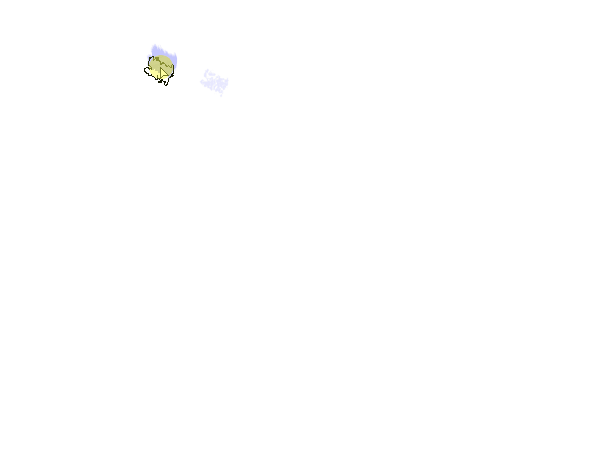
In addition, it seems that this plug-in will cause the windows process to always exist. 445 is not stuck, but it also has this problem. If it is the steam version, it will prompt “The software is running” and cannot be opened for the second time
I do not recommend running Tela or Pigmento on any test Builds. Both relay on the fact of Krita working as expected and it does not seem to be the case with Krita 5. When it arrives to the stable state I will correct any inconsistencies. Until then I can only assume it is something that is still WIP.
I have seen this and this usually happens when you close Krita with floating dockers and it can be any docker. however I can’t trigger this 100% sure with my dockers or with Krita’s dockers to make any worthwhile report. This because undocked dockers will remain open even as it closes and are left behind. I don’t manage dockers, Krita does. This means Tela is the one being managed.
In both Tela and Pigmento I have signals that when a Krita close event is triggered I close all functions and do saves and then the plugin is literally offline. if Krita is still not closes after I really can’t do more at least that I know of. Sorry.
def closeEvent(self, event):
# Stop Delta Situation
self.layout.doc_delta_reference.setChecked(False)
# Stop QTimer
if check_timer >= 1:
self.timer.stop()
# Save Settings
self.Default_Save()
5.0 is just a supplement. I already encountered this problem when I updated to 447…
I just updated and I can see the lag spike now. I don’t know this seems weird. Krita seems a bit dodgy. was not 4.4.5 to be the last release before 5?
All the formating is wrong even on simple elements and they like wiggle making temporary lines out of no where. It is like PyQt is making weird calculations now. I gotta fix such annoying things now  This is all throughout Krita and my Plugins now.
This is all throughout Krita and my Plugins now.
I guess the QThread has some issue and I have to temper it even more? this should not be, the whole point of the QThread is to not clog the UI performance. it is somewhere related to the QImage update for sure.
To fix these I will probably have to do research or something but I gotta work first. Either way now I don’t have the slightest clue what changed to cause this. I fear I might have to try and make a new plugin all together just to get the info I need without clutter to fix this.
I worry to fix this for 4.4.7 and then krita 5 does not have this behavior and then I did work for nothing.